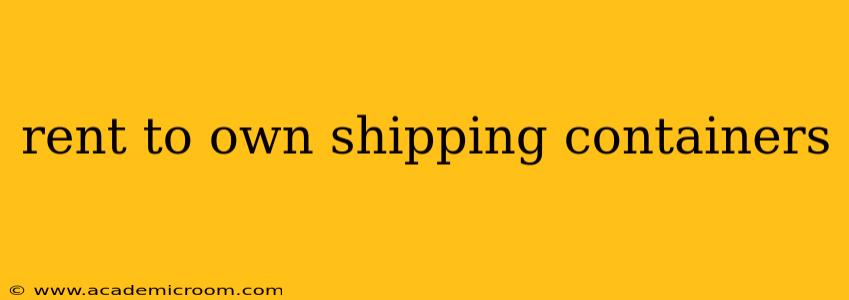The dream of owning your own space, whether for a business, storage, or even a unique home, is often hampered by upfront costs. Rent-to-own shipping containers offer a compelling alternative, allowing you to gradually acquire ownership while enjoying immediate use. This guide explores the ins and outs of this increasingly popular option, addressing common questions and concerns.
What is Rent-to-Own for Shipping Containers?
Rent-to-own, or lease-to-own, arrangements for shipping containers allow you to rent a container for a set period, with a portion of each rental payment applied towards the purchase price. Once the agreed-upon term is complete, and all payments are made, you become the legal owner of the container. This approach circumvents the need for a large upfront capital investment, making container ownership more accessible to a wider range of individuals and businesses.
How Does Rent-to-Own Differ from Traditional Purchasing?
The primary difference lies in the payment structure. Traditional purchasing requires a significant upfront payment, often a substantial down payment followed by financing or full payment. Rent-to-own, on the other hand, spreads the cost over time through regular monthly payments, making it a more manageable financial commitment. However, it's crucial to understand that you’ll likely pay more in total over the life of the agreement compared to a lump-sum purchase. This added cost covers the financing aspect offered by the rent-to-own provider.
What are the Benefits of Renting to Own a Shipping Container?
- Affordability: The staggered payment schedule makes container ownership attainable for those with limited immediate capital.
- Flexibility: You can use the container immediately while making payments towards eventual ownership.
- Predictable Costs: Monthly payments are generally fixed, providing budgetary stability.
- Easier Access to Financing: Rent-to-own options may be available to individuals who might not qualify for traditional financing.
What are the Drawbacks of Renting to Own a Shipping Container?
- Higher Overall Cost: As mentioned, rent-to-own agreements typically result in a higher total cost compared to outright purchase.
- Potential for Default: Failure to make payments can lead to the loss of the container and any payments already made.
- Limited Customization: Some rent-to-own agreements may restrict modifications to the container.
- Contractual Obligations: Carefully review the contract terms to understand all fees, penalties, and conditions.
How Much Does it Cost to Rent to Own a Shipping Container?
The cost varies significantly depending on several factors, including:
- Container Size: Larger containers naturally cost more.
- Condition: New containers command higher prices than used ones.
- Location: Transportation and delivery costs influence the overall price.
- Length of Agreement: Longer agreements may lead to higher overall costs.
- Provider: Different providers have varying pricing structures.
It's crucial to obtain quotes from multiple providers before committing to any agreement.
Where Can I Find Rent-to-Own Shipping Container Options?
Several companies specialize in rent-to-own shipping containers. Searching online for "rent-to-own shipping containers [your location]" will yield relevant results. It's recommended to compare offers from multiple providers to find the best deal. Always thoroughly investigate the reputation and legitimacy of any provider before entering into an agreement.
What Should I Look for in a Rent-to-Own Agreement?
- Clearly Defined Terms: Ensure the contract explicitly outlines all costs, payment schedules, and conditions.
- Transparency: The provider should be open about all fees and charges.
- Fair Market Value: Compare the total cost to the market value of a similar container to assess the fairness of the agreement.
- Reputable Provider: Choose a provider with a good track record and positive customer reviews.
What Happens if I Default on My Payments?
Consequences for defaulting on payments vary depending on the provider and the terms of the agreement. This could include repossession of the container, damage to your credit score, and potential legal action. Always prioritize making payments on time to avoid these negative consequences.
This guide provides a comprehensive overview of rent-to-own shipping containers. Remember to conduct thorough research and carefully consider all aspects before entering into any agreement. The right rent-to-own option can provide a cost-effective path to container ownership, but informed decision-making is key to a positive experience.
